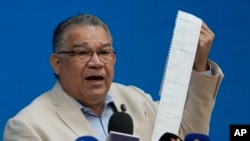A panel of experts from the United Nations bolstered allegations that Venezuela’s July 28 presidential election result was deeply flawed.
The government-aligned National Electoral Council, or CNE, of Venezuela certified the vote for incumbent President Nicolas Maduro on July 29 without releasing tabulated precinct-level official results, sparking nationwide protests.
The four-member U.N. team, which spent a month on the ground in the run-up to the poll, said the CNE “fell short of the basic transparency and integrity measures” that are essential to holding credible elections.
Maduro routinely calls the opposition fascist as he and his allies continue efforts to undermine their opponents and observers critical of the announced election result.
On August 14, Venezuelan Foreign Minister Yvan Gil accused the U.N. experts of “deliberately” concealing a plot by “far-right” leaders to undermine the election results and incite violence.
“The Bolivarian Republic of Venezuela categorically rejects the publication of the so-called ‘Preliminary Report’ by the Electoral Expert Panel of the United Nations, which disseminates a series of lies,” Gil said in a statement.
He said that “the opinion expressed in their irresponsible report is nothing more than propaganda serving the coup-mongering interests of the Venezuelan far right, with whom they interacted constantly before, during and after the elections.”
That is false.
While Venezuelan authorities have withheld the official vote tally, a set of transparency safeguards baked into the election process allowed the opposition Unitary Platform to compile verifiable evidence that its candidate, Edmundo Gonzalez, won the election.
Anticipating the government might try to steal the election, the opposition prepared for months to guarantee it would secure as many vote records as possible, employing thousands of volunteers to help.
The electronic voting machines at polling stations produce a paper receipt, which voters place in ballot boxes, confirming their choice for president. After the polling stations close, the voting machines produce a record showing how many votes each candidate got.
Those vote tally sheets contain readable QR codes, which contain the voting results.
The electoral authorities receive a copy of each tally sheet, and they are supposed to give such copies to representatives of each party as well.
The U.N. team said it had “received several reports that agents of opposition parties had been prevented from obtaining such a copy.”
The U.K.’s Guardian newspaper documented a case in which a soldier refused to give an opposition-accredited observer access to a tally sheet, dragged him into a bathroom and locked him inside until the polling station closed.
An electoral official secretly handed that observer a copy of the tally sheet after the soldier released them. The observer then photographed the QR code obtaining the voting results.
Altogether, the opposition acquired 83.5% of the precinct-level vote tally sheets as of August 15. They showed Gonzalez received 67% of votes to Maduro’s 30%.
Even if Maduro received all of the remaining 16.5% of votes, he could not overcome the vote deficit.
On August 14, White House press secretary Karine Jean-Pierre referred to the interim U.N. report, saying Maduro “has yet to come clean about the July 28 presidential election results.”
It “is abundantly clear to the majority of the Venezuelan people, the United States and a growing number of countries that the CNE has not provided full, detailed, tallied votes because they would show that [Edmundo Gonzalez] won the most votes,” Jean-Pierre said.
Maduro has responded to criticism by violently cracking down on demonstrations against his contested reelection. His security forces have arrested more than 2,000 people.
On August 12, U.N. human rights investigators said 23 people had been killed, “the vast majority caused by gunfire, between 28 July and 8 August in the context of the protests.”
The U.N. called on the Venezuelan government to “immediately end” the post-election “escalating repression” and “investigate the spate of grave human rights violations that are currently occurring.”
Meanwhile, the U.N. experts noted other issues in the run-up to the election, including press freedom issues.
They said state-owned media outlets “provided limited access for opposition candidates.”
The Committee to Protect Journalists said that “government control of the media and self-censorship has distorted election coverage in Venezuela and deprived voters of vital information about the presidential candidates.”







